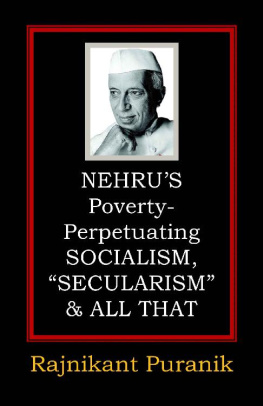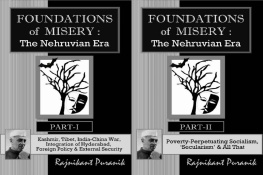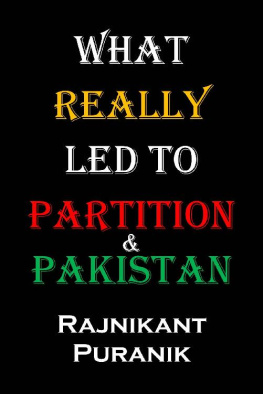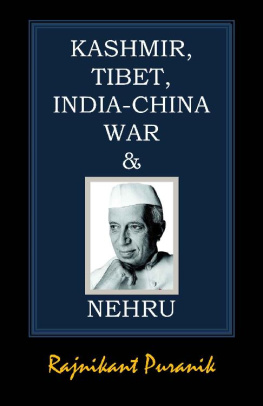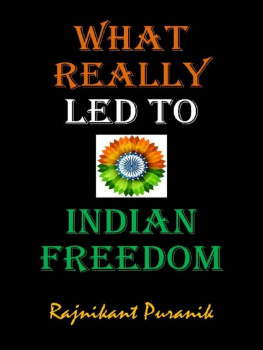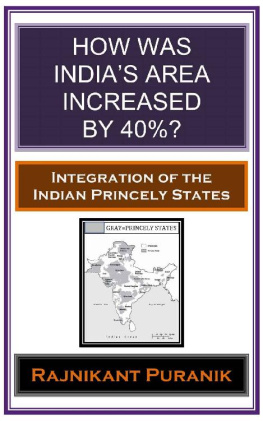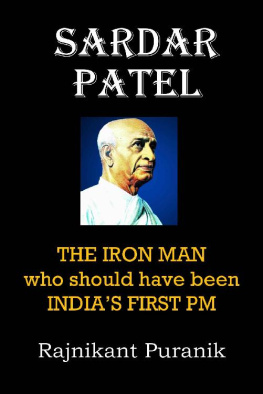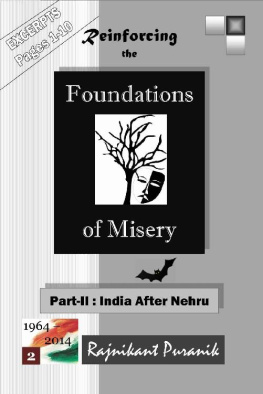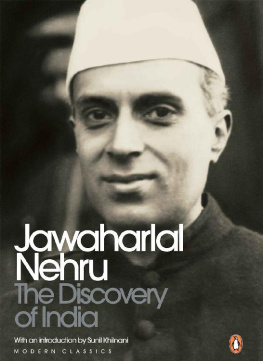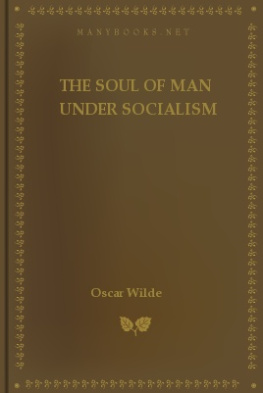Rajnikant Puranik - Nehru’s Poverty-Perpetuating Socialism, “Secularism” & All That
Here you can read online Rajnikant Puranik - Nehru’s Poverty-Perpetuating Socialism, “Secularism” & All That full text of the book (entire story) in english for free. Download pdf and epub, get meaning, cover and reviews about this ebook. year: 2018, genre: Politics. Description of the work, (preface) as well as reviews are available. Best literature library LitArk.com created for fans of good reading and offers a wide selection of genres:
Romance novel
Science fiction
Adventure
Detective
Science
History
Home and family
Prose
Art
Politics
Computer
Non-fiction
Religion
Business
Children
Humor
Choose a favorite category and find really read worthwhile books. Enjoy immersion in the world of imagination, feel the emotions of the characters or learn something new for yourself, make an fascinating discovery.
- Book:Nehru’s Poverty-Perpetuating Socialism, “Secularism” & All That
- Author:
- Genre:
- Year:2018
- Rating:4 / 5
- Favourites:Add to favourites
- Your mark:
- 80
- 1
- 2
- 3
- 4
- 5
Nehru’s Poverty-Perpetuating Socialism, “Secularism” & All That: summary, description and annotation
We offer to read an annotation, description, summary or preface (depends on what the author of the book "Nehru’s Poverty-Perpetuating Socialism, “Secularism” & All That" wrote himself). If you haven't found the necessary information about the book — write in the comments, we will try to find it.
Rajnikant Puranik: author's other books
Who wrote Nehru’s Poverty-Perpetuating Socialism, “Secularism” & All That? Find out the surname, the name of the author of the book and a list of all author's works by series.
Nehru’s Poverty-Perpetuating Socialism, “Secularism” & All That — read online for free the complete book (whole text) full work
Below is the text of the book, divided by pages. System saving the place of the last page read, allows you to conveniently read the book "Nehru’s Poverty-Perpetuating Socialism, “Secularism” & All That" online for free, without having to search again every time where you left off. Put a bookmark, and you can go to the page where you finished reading at any time.
Font size:
Interval:
Bookmark:
Nehrus |
Rajnikant Puranik |
Nehrus
Poverty-Perpetuating Socialism,
Secularism & All That
by
Rajnikant Puranik
Categories: Non-fiction, History
This Edition: August 2018
Copyright 2018 Rajnikant Puranik
Available at Amazon and Pothi.com
For all books by the Author, their details, and from where to procure them, please check
www.rkpbooks.com
To the fond memory of my late parents
Shrimati Shakuntala and
Shri Laxminarayan Puranik
- - -
Thanks to
Devbala, Shrikant Bhaisaab, Akhil Chandra, Manasi, Manini
for encouragement and help.
All rights reserved. No part of this publication may be reproduced, distributed or transmitted in any form or by any means, whether electronic/digital or print or mechanical/physical, or stored in an information storage or retrieval system, without the prior written permission of the copyright owner, that is, the author, except as permitted by law. However, extracts up to a total of 1,000 words may be quoted without seeking any permission, but with due acknowledgement of the source. For permission, please write to rkpuranik@gmail.com .
It has been said that the road to hell is often paved with best intentions, and despite the probable best intentions, The Nehruvian Era, 194764 unfortunately laid the firm foundations of Indias misery. The same are detailed in this book.
This is the second part of the two-part book on the Nehruvian era (194764). Part-I covered the Kashmir botch-up; erasure of Tibet as a nation; the Himalayan blunder of the India-China war; prevention of Pakistan-II by integration of the Hyderabad Princely State into India by Sardar Patel, despite Nehrus muddle-headedness; and the failed foreign and external security policies of Nehru. This part covers the rest, followed by evaluation of the Nehruvian era.
For a fair and objective evaluation of the Nehruvian era, the book adopts a set of rules, the dos and the donts :
Rule-1 (Dos) . When evaluating a national leader, evaluate his or her contribution to the nation on a set of vital parameters, for example, GDP, Per-Capita Income, Relationship with Neighbours, Internal Security Position, External Security Position, Literacy Level, and so on. Determine those set of parameters at the start of the tenure of that leader, and also at the end of his or her tenure. Check the difference.
Rule-2 (Dos) . The above, by itself, is not sufficient. Some progress would anyway be made with the passage of time. The point is whether the progress was as much as it could or should have been. For this, also determine a set of developing, but fast-growing countries against whom you would like to benchmark your performance. Evaluate the progress of those countries for the same period. Compare.
Rule-3 (Donts) . Do not mix the personal with the professional or the political. There is little point offsetting poor political performance against good personal traits, and vice versa.
Rule-4 (Donts) . Greatness has nothing to do with popularitymedia can be managed, popularity can be purchased, general public can be manipulated and led up the garden path. Nor has greatness anything to do with ruling for a long time. The point is, what you did for the people and the country. If you did little, you actually wasted the precious time of the people and the country.
Rule-5 (Donts) . Dont go by generalised descriptions or attributes that dont measure the real comparative position on the ground. For example, statements like, He was a great democrat, thoroughly secular, highly honest, scientific-minded person who loved children and gave his all to the nation, dont help the purpose of evaluation.
Rule-6 (Donts) . Dont go by what the person wrote or spoke or claimed. A person may talk big on lofty ideals and make grand claims, but the real test is what concrete difference he made to the nation and to the lives of people.
Unless a leader scores high as per rules 1 and 2, he or she cannot be adjudged as great. This is quite logical. You do not evaluate Sachin Tendulkar's cricket on his personal goodness, you evaluate it on his performance on the field, on runs scorednot in isolation or as an absolute, but in comparison with others. You evaluate Ratan Tata or Mukesh Ambani or Narayan Murthy by evaluating the performance of the companies they are heading. If the companies are doing well, you give credit to them. But, rare is a case where a company does badly or goes into bankruptcy, and you still evaluate the person heading it as good and competent. Strangely, this common sense approach goes for a toss when you try to evaluate a political leader.
This book looks into the concrete aspects of India after independence during the Nehruvian era to evaluate Nehru and the Nehruvian era. The book does not trouble itself with the personal side of Nehru like how he looked or his sartorial style or with other irrelevant issues.
Rajnikant Puranik
Citations are given as super-scripts in the text, such as {Azad/128}.
Citation Syntax & Examples
{Source-Abbreviation/Page-Number}
e.g. {Azad/128} = Azad, Page 128
{Source-Abbreviation/Volume-Number/Page-Number}
e.g. {CWMG/V-58/221} = CWMG, Volume-58, Page 221
{Source-Abbreviation} for URLs (articles on the web), and for digital books (including Kindle-Books), that are searchable, where location or page-number may not be given.
e.g. {VPM2} , {URL15}
{Source-Abbreviation/Location-Number} for Kindle Books
e.g. {VPM2} , {VPM2/L-2901}
Example from Bibliography Table at the end of this Book
Azad | B | Maulana Abul Kalam Azad India Wins Freedom . Orient Longman. New Delhi. 2004 |
CWMG | D, W | Collected Works of Mahatma Gandhi. Vol. 1 to 98. http://gandhiserve.org/e/cwmg/cwmg.htm |
URL15 | U | Article Nehru vs Patel: Ideological Rift, Hardly a Trivial One. Rakesh Sinha, Sunday Express. 10-Nov-2013. www.pressreader.com/india/sunday-express8291/20131110/282033324959792 |
VPM2 | K, D | V.P. Menon The Transfer of Power in India . Orient Longman. Chennai. (1957) 1997. books.google.co.in/books?id=FY5gI7SGU20C |
The second column above gives the nature of the source : B=paper Book, D=Digital Book/eBook other than Kindle, K=Kindle eBook, U=URL of Document/Article on Web, W=Website, Y=YouTube.
Nehrus Poverty-Perpetuating Socialism
Poor countries are poor because those who have power
make choices that create poverty.
Daron Acemoglu and James A. Robinson
Are one or more of these the factors that make a country poor or prosperous: climate, geography, location, abundance of natural resources, race, history, type of people, character of people?
No. None of these.
Daron Acemoglu and James Robinson in their book Why Nations Fail : The Origins of Power, Prosperity and Poverty demonstrate, inter alia, that climate, geography, location, history, race, type of people are NOT the reasons a country is rich or poor.
They take examples of neighbouring countries with identical climate, geography, location, history, race and type of people, where one-side is poor and the other prosperous: Mexico and the states of the US bordering it like Texas; North Korea and South Korea; Haiti and the Dominican Republic in the Caribbean region. One can add to these comparisons the Mainland China till the early eighties versus Taiwan; and Malaysia versus Singapore.
Font size:
Interval:
Bookmark:
Similar books «Nehru’s Poverty-Perpetuating Socialism, “Secularism” & All That»
Look at similar books to Nehru’s Poverty-Perpetuating Socialism, “Secularism” & All That. We have selected literature similar in name and meaning in the hope of providing readers with more options to find new, interesting, not yet read works.
Discussion, reviews of the book Nehru’s Poverty-Perpetuating Socialism, “Secularism” & All That and just readers' own opinions. Leave your comments, write what you think about the work, its meaning or the main characters. Specify what exactly you liked and what you didn't like, and why you think so.

